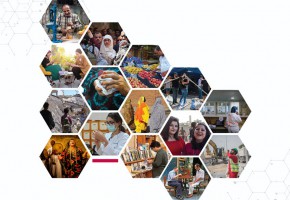
Ending the war in Yemen as a prerequisite to realizing the right to health
This research is a part of the Arab Watch Report 2023 on the right to Health.
Ending the war in Yemen as a prerequisite to realizing the right to health: The impact of war and political conflicts on health indicators and determinants - Dalia Hyzam, PhD, & Abeer Shaef, PhD
Please click here to download the full report.
Introduction
The right to health, enshrined in the Universal Declaration of Human Rights, is the foundation underpinning fair and equitable health systems. Health is sometimes defined as modern hospitals and well-equipped medical centers, which is partly true. However, the concept of health is much more comprehensive. The World Health Organization (WHO) defines health as a state of complete physical, mental, and social well-being and not merely the absence of disease or infirmity. In other words, health is a state where a person enjoys the highest attainable health standards that lead to a life of dignity (WHO 1948).
The right to health entails healthcare based on the availability, acceptability, quality, and accessibility of health services. It also encompasses related determinants such as safe drinking water, adequate nutrition, healthy and adequate livelihoods, and access to health education and information (United Nations 1948). Moreover, in its General Comment No. (14), the United Nations Committee on Economic, Social, and Cultural Rights (ECOSOC) has affirmed the primary principles of the right to health: non-discrimination, participation, and accountability. On the other hand, the WHO Constitution states that the responsibility for the right to health rests with governments, Civil Society Organizations (CSOs), agencies, and individuals collectively (WHO, 1948).
The health system in Yemen faces several challenges in providing health services and enabling community access to these services, albeit at a minimum level of quality. The war and blockade have also had a devastating impact on many health indicators in Yemen including; mothers and children health care. For instance; low vaccination coverage for children, high incidence of diarrhea, anemia, and mortality among children under five years of age, and high maternal mortality rate. Furthermore, the already fragile health system’s provision of routine primary healthcare services has been diminished by the urgent need to respond to the threat of food insecurity and the recent cholera epidemic (El Bcheraoui et al. 2018). In addition, many routine services were suspended amid the COVID-19 pandemic due to mismanagement, causing a decline in the urgent response to infected cases (Zawiah et al. 2020).
The conflict in Yemen escalated in 2010, followed by large protests, infighting, and a war that began in September 2014 and continues to this day. Before the outbreak of the war between the Saudi-led coalition and the Houthis, Yemen was already the poorest country in the Middle East and one of the poorest in the world. The humanitarian crisis harmed all of Yemen’s vital sectors, including health (El Bcheraoui et al. 2018). The conflict expanded after the Houthis’ military takeover of the capital in September 2014. War broke out, and the Saudi-led coalition began its military operations. Consequently, Yemen was placed under Article VII of the United Nations Charter and classified in a state of war/conflict. The humanitarian affairs in Yemen including health are now coordinated through the annual Humanitarian Needs Overview (UN OCHA-HNO 2022), the annual Humanitarian Response Plan, and donors contributions (UN OCHA-HRP 2022). Coordination to implement these plans is carried out across various clusters (health, nutrition, water and sanitation, food security and agriculture, protection, and education). Although most of these plans and activities guarantee health for all groups, especially those with conflict-related particularities, notwithstanding these plans and activities generally focus on relief, urgent support, and emergencies (UN OCHA 2022). A public health expert noted:
The leadership and governance policy of the Ministry of Public Health and Population (MoPHP) and its offices in the governorates toward health cluster is weak. The leadership of the health cluster is given to international organizations, although these organizations are not entrusted for this task…The concept of clusters paved the way for working through a multi-sectoral approach, yet not in a formal manner as long as there is no law guaranteeing this approach in Yemen. Working through a multi-sectoral approach is still within the framework of humanitarian emergency responses in Yemen” (Participant 2: Public Health Expert and Academic, 2022).
Yemen is experiencing the worst humanitarian crisis in the world. Current data indicates that nearly 80% of the population requires some form of humanitarian assistance and social protection (ICRC, 2022). Since Yemen has not officially achieved the reconstruction stage and sustainable development, broadening the concept of right to health has not been targeted yet, especially in affairs related to development, social protection, supportive infrastructure, governance, and effective community participation. The comprehensive national dialogue outcomes and the new constitution of Yemen remain subject to ending the war, achieving peace, and the transitional phase of governance. A reproductive health care expert confirmed that:
“Yemeni citizens do not enjoy )the right to health for all(, not even at its lowest level since before 2015. Health national policies and strategies have been formulated; however, they are not applicable on the ground and have not been implemented. We still believe that health is a person’s who is free from disease. We have not defined health as a right in our programs and projects nor reached the stage of thinking about well-being” (Participant 1: Expert in Reproductive Health Care, NGO, 2022)
Dalia Hyzam, PhD, & Abeer Shaef, PhD
Please click here to download the full report.
This research is a part of the Arab Watch Report 2023 on the right to Health.
Recent publications

Thematic Report: Exploiting Resources, Ignoring Rights: A Political Ecology of Water and Energy in the Arab World
Related publications


